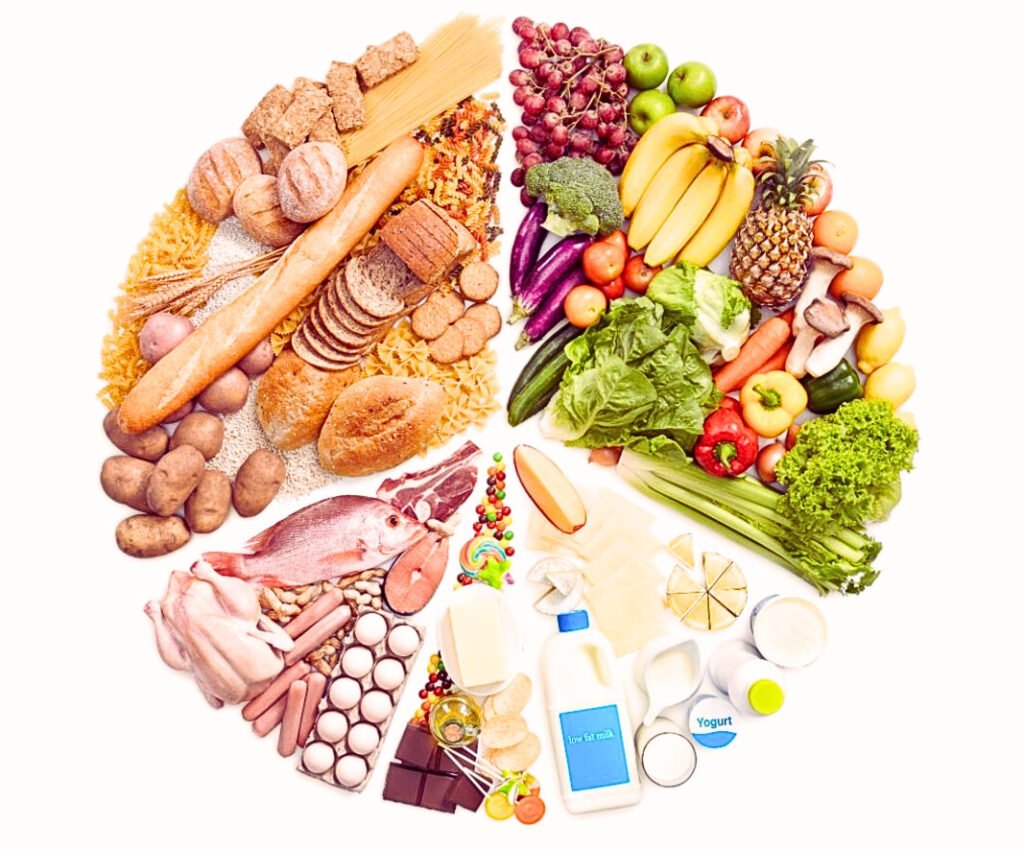1. INTRODUCTION
A balanced diet is the foundation of good health. It provides our body with essential nutrients and energy for proper functioning. In this article, we will throw light on the intricacies of a balanced diet and guide you on how to create a personalized diet chart to suit your needs.
2. What is a Balanced Diet?
A balanced diet includes a variety of foods in the right proportions. It contains carbohydrates, proteins, fats, vitamins, and minerals in optimal amounts to meet our nutritional requirements. This diet ensures that our body gets all the essential nutrients it needs to function properly.
3. The Benefits of a Balanced Diet
A balanced diet is the foundation of good health, which provides many benefits for your health. This ensures that you receive a diverse range of essential nutrients, including vitamins, minerals, and antioxidants, which promote overall vitality.
In addition, a balanced diet makes it more possible to maintain a healthy weight, as it reduces the likelihood of overeating and aids in weight management. Including fiber benefits your digestive system, resulting in regularity and a healthy bowel.
Enhanced energy levels and a stronger immune system are also byproducts, helping you stay active and resilient to illness. Finally, a balanced diet reduces the risk of chronic diseases and supports better mental health, making it a key component of a healthy lifestyle. Maintaining a balanced diet offers several benefits:

1. Improved Energy Levels
A balanced diet is the foundation of good health, which provides many benefits to your health. This ensures that you receive a diverse range of essential nutrients, including vitamins, minerals, and antioxidants, which promote overall vitality. In addition, a balanced diet makes it more possible to maintain a healthy weight, as it reduces the likelihood of overeating and aids in weight management.
Including fiber benefits your digestive system, resulting in regularity and a healthy bowel. An important benefit is increased energy levels; A balanced diet provides a steady source of energy throughout the day, complex carbohydrates, found in whole grains, provide sustained vitality, while protein and healthy fats help maintain these levels. This sustained energy can increase productivity and improve quality of life.

2. Healthy Weight Management
A balanced diet is the cornerstone of good health, providing many benefits for your overall health. By providing your body with a diverse range of essential nutrients, including vitamins, minerals, and antioxidants, it promotes optimal vitality. In addition, a balanced diet plays an important role in achieving and maintaining a healthy weight.
This helps you avoid excessive consumption of empty-calorie foods, making weight management more feasible and reducing the risk of obesity-related health problems. It not only enhances your physical health but also contributes to a higher quality of life by improving self-esteem and overall confidence.
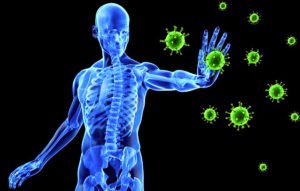
3. Enhanced Immune System
A balanced diet serves as the cornerstone of good health, providing countless benefits for your overall well-being. By providing a wide range of essential nutrients such as vitamins, minerals, and antioxidants, it supports your body’s vitality and optimal functioning. Additionally, a balanced diet strengthens your immune system, making it more resilient to diseases.
Nutrient-rich foods, including fruits and vegetables, supply essential vitamins and antioxidants that enhance the effectiveness of the immune system. For example, vitamin C, abundant in citrus fruits like oranges and strawberries, is renowned for its immunity-boosting properties.
By adopting a balanced diet, you not only nourish your physical health but also strengthen your body’s defenses, helping it fight diseases more effectively. This contributes to an overall healthier and more vibrant life.

4. Better Digestion
A balanced diet is the foundation of good health, which provides many benefits for your overall health. Providing a wide range of essential nutrients, including vitamins, minerals, and antioxidants, supports your body’s vitality and optimal functioning.
In addition, a balanced diet helps promote better digestion. The incorporation of fiber-rich foods helps in regular bowel movements, prevents constipation, and ensures smooth functioning of the digestive system. Additionally, fiber nourishes beneficial gut bacteria, promoting a healthy gut microbiome.
This combination not only improves digestion but also contributes to overall gut health, which is essential for your well-being. Therefore, by adopting a balanced diet, you are not only taking care of your physical health but also ensuring that your digestive system is working at its best.

5. Mental Clarity
A balanced diet is the cornerstone of good health, providing a host of benefits for your overall health. Providing a wide range of essential nutrients, including vitamins, minerals, and antioxidants, supports your body’s vitality and optimal functioning.
Apart from physical health, a balanced diet also has a profound impact on mental clarity and cognitive function. Certain foods rich in omega-3 fatty acids, such as salmon and walnuts, are known to help increase brain health, memory, concentration, and overall mental acuity.
By adopting a balanced diet, you are not only nourishing your body but also sharpening your mind, which will lead to improved mental clarity and a more productive and satisfying life.
4. Components of a Balanced Diet
Carbohydrates
Carbohydrates are one of the three essential macronutrients, along with proteins and fats, and they play a vital role in providing energy to the body. Carbohydrates are mainly found in foods such as grains, fruits, vegetables, legumes, and dairy products. When consumed, carbohydrates are broken down into glucose, which serves as the primary source of energy for the body.
They are classified into two main types: simple carbohydrates, which include sugars like glucose and fructose, and complex carbohydrates, which are found in foods like whole grains and starchy vegetables.
Complex carbohydrates are preferred in a balanced diet because they provide a steady, continuous source of energy, whereas simple carbohydrates can cause rapid energy spikes and crashes. Carbohydrates also play a role in supporting brain function and are an essential part of a healthy diet, contributing to overall vitality and well-being.
Proteins
Proteins are fundamental macronutrients important for body structure and function. They are made of amino acids, which are often referred to as the building blocks of life. Proteins play many roles in the body, including repairing and building tissues, supporting immune function, and aiding in the production of enzymes and hormones.
Dietary sources of protein include both animal-based options such as meat, poultry, fish, and dairy, as well as plant-based sources such as legumes, nuts, and tofu. The body requires a variety of amino acids for optimal health, some of which it can produce on its own and others it must obtain from food.
Ensuring adequate intake of protein is essential for maintaining muscle mass, supporting overall bodily functions, and promoting satiety, making it an important component of a balanced diet.
Fats
Fat, also known as lipid, is an essential macronutrient that performs many important functions in the body. While often maligned, fats are important to overall health. They provide a concentrated source of energy, with each gram of fat supplying more than twice as many calories as carbohydrates or protein.
Fats are essential for the absorption of fat-soluble vitamins (A, D, E, and K) and play an important role in building and maintaining cell membranes. They are classified into different types, including saturated fats found in animal products and some plant oils, unsaturated fats found in nuts, seeds, and vegetable oils, and essential fatty acids such as omega-3 and omega-6. , which must be obtained through it. Diet.
A balanced diet includes a variety of fats, with an emphasis on unsaturated fats and essential fatty acids, as they are linked to heart health and other essential bodily functions. Maintaining a proper balance of fats in your diet is essential for overall health.
Vitamins
Vitamins are essential organic compounds that the body needs in small amounts to maintain proper health and functioning. These micronutrients are important for various physiological processes, such as metabolism, immunity, and the maintenance of healthy skin, eyes, and bones.
There are two main categories of vitamins: fat-soluble vitamins (A, D, E, and K), which are absorbed and stored in fat tissue, and water-soluble vitamins (B-complex vitamins and vitamin C), which dissolve. It is not stored in equal quantities in water and the body. Each vitamin has specific functions, and a deficiency of any of them can lead to various health problems.
Getting a well-rounded diet that includes a variety of fruits, vegetables, whole grains, lean proteins, and dairy or dairy alternatives is essential to ensuring adequate intake of essential vitamins for overall health and vitality.
Minerals
Minerals are essential inorganic nutrients that play important roles in various physiological functions within the human body. These micronutrients are needed in relatively small amounts but are important for maintaining overall health and well-being.
Minerals can be divided into two categories: trace minerals, such as calcium, magnesium, and potassium, which are needed in large amounts, and trace minerals, including iron, zinc, and copper, which are needed in smaller amounts.
Each mineral has specific functions; For example, calcium is essential for strong bones and teeth, while iron is important for oxygen transport in the blood. Minerals also contribute to maintaining proper fluid balance, nerve function, and muscle contraction.
A balanced diet that includes a variety of foods such as dairy products, lean meats, nuts, seeds, and whole grains ensures adequate intake of these essential minerals, supporting overall health and preventing deficiencies.
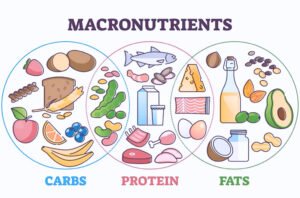
5. How to Create a Balanced Diet Chart
Creating a balanced diet chart involves thoughtful planning to ensure that you are getting a wide range of essential nutrients while managing portion sizes. Start by determining your daily calorie needs based on factors such as age, gender, activity level, and goal (e.g., maintenance, weight loss, or muscle gain).
Next, break down your daily calorie intake into macronutrients – carbohydrates, proteins, and fats – keeping in mind that a general guideline is about 50-60% carbohydrates, 15-20% protein, and 25-30% fat.
Prioritize whole foods in these categories. For carbohydrates, focus on complex carbohydrates like whole grains, fruits, and vegetables. Choose lean protein sources like poultry, fish, beans, and tofu for your protein intake. Include healthy fats from sources like avocado, nuts, and olive oil.
Additionally, include a variety of fruits and vegetables in your diet to ensure you get a wide range of vitamins and minerals.
To maintain balance, monitor portion sizes and avoid excessive consumption of processed or sugary foods. It is also important to stay hydrated, so remember to drink plenty of water throughout the day. Finally, be flexible and adaptable, as everyone’s nutritional needs are unique.
Evaluate your diet chart regularly to make sure it is in line with your health goals and lifestyle. Consulting a registered dietitian can provide valuable guidance in creating a personalized balanced diet chart. Creating a balanced diet chart is an individual process. Here are the steps to help you get started:
Assess Your Dietary Needs
Assessing your dietary needs is an important step in establishing a healthy and balanced eating plan. To start, consider factors like age, gender, activity level, and any specific health goals you have, such as weight management or addressing dietary restrictions or allergies.
Understanding your caloric needs is fundamental; It can be calculated based on factors such as basal metabolic rate (BMR) and daily activity level. Next, check your macronutrient requirements—carbohydrates, proteins, and fats.
Recommended proportions may vary depending on individual factors and goals, but a general guideline is to aim for a well-balanced distribution, with carbohydrates providing the majority of calories, followed by proteins and fats.
Choose a Variety of Foods
Choosing a variety of foods is a fundamental principle of creating a balanced and nutritious diet. By including a variety of foods in your diet, you ensure that your body receives a wide range of essential nutrients, vitamins, and minerals.
Each food item brings its own unique set of nutrients and health benefits to the table. For example, fruits and vegetables provide a range of vitamins and antioxidants, while whole grains provide fiber and complex carbohydrates for sustained energy. Lean proteins, such as poultry, fish, and beans, are essential for muscle repair and overall bodily function.
Healthy fats from sources like avocados and nuts support heart health and cognitive function. By diversifying your food choices, you not only increase the nutritional value of your diet but also make your meals more enjoyable and satisfying. Additionally, it reduces the risk of developing nutritional deficiencies and promotes overall well-being.
So, when planning your meals, aim to include a colorful range of foods from different food groups to ensure a complete and balanced diet that supports your health and vitality.
Portion Control
Portion control is an important aspect of maintaining a balanced and healthy diet. This involves managing the amount of food you eat in one sitting, which directly affects your calorie intake. Controlling portion sizes can help prevent overeating and promote weight management.
An effective way to practice portion control is to become familiar with the recommended serving sizes for various foods and to use measuring devices such as cups or food scales to ensure accuracy. Another useful strategy is to listen to your body’s hunger signals and stop eating when you feel satisfied, rather than finishing everything on your plate.
Eating mindfully, savoring each bite, and avoiding distractions during meals can also help with portion control by making you more aware of how much you’re eating. By practicing portion control, you can strike a balance between enjoying the foods you love and maintaining a diet consistent with your health goals, which ultimately contributes to better overall wellness.
Meal Timing
Meal timing is an essential aspect of a balanced diet and can have a significant impact on your overall health and energy levels. Ideally, to maintain consistent energy levels, it’s best to spread your meals throughout the day, aiming for three main meals and small, nutritious snacks in between. Breakfast is often called the most important meal, as it revs up your metabolism and provides essential nutrients after a night’s rest. Lunch should provide a large portion of your daily calories, giving you energy for the afternoon.
Dinner, although important, should generally be light to aid digestion before bedtime. Snacks can help maintain energy levels and prevent overeating during main meals. Additionally, paying attention to your body’s hunger signals and eating when you are truly hungry, not out of habit or boredom, can contribute to better meal timing and portion control.
However, personal preferences and lifestyle can affect meal timing, so it’s important to find a schedule that works best for you and ensures you’re meeting your nutritional needs throughout the day.
Hydration
Hydration is a fundamental aspect of maintaining overall health and well-being. Water is essential for many bodily functions, including digestion, temperature regulation, and transportation of nutrients and oxygen to cells. Maintaining proper hydration helps prevent dehydration, which can lead to fatigue, dizziness, and impaired cognitive function.
Daily recommended water intake varies depending on factors such as age, climate, and activity level, but a general guideline is to aim for about 8–10 cups (64–80 oz) of water per day. This can come from a combination of plain water, beverages like herbal teas, and water-rich foods like fruits and vegetables.
It’s important to listen to your body’s signals for thirst and make sure you stay adequately hydrated, as proper hydration is essential for your body to function optimally and support your overall health and vitality.
6. Sample Balanced Diet Chart
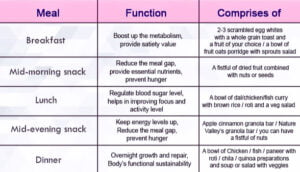
1. Breakfast
Breakfast is often considered the most important meal of the day, and for good reason. It jump-starts your metabolism, replenishes your energy levels, and provides the nutrients your body and mind need to energize.
A balanced breakfast usually includes a combination of carbohydrates, proteins, and healthy fats. Choices like whole-grain oatmeal with a sprinkle of fresh berries and almonds provide complex carbohydrates for sustained energy, fiber for digestive health, antioxidants from berries, and healthy fats from nuts.
Alternatively, you can choose a protein-rich breakfast with eggs or Greek yogurt, which helps keep you satiated and provides essential amino acids for muscle repair and overall bodily function. Along with your main dish, a glass of freshly squeezed orange juice or a cup of green tea can provide additional vitamins and antioxidants.
By starting your day with a balanced breakfast, you set a positive outlook for your eating habits and provide your body with the nutrients it needs for the day.
• Oatmeal with fresh berries and a spoonful of honey.
• A glass of freshly squeezed orange juice.
2. Lunch
Lunch is an important meal of your day, providing an opportunity to recharge and maintain your energy levels for the afternoon. A balanced lunch should be a complete combination of nutrients to keep you satisfied and nourished. Consider including lean proteins like grilled chicken or tofu, which provide essential amino acids for muscle repair and overall physical function. Supplement protein with a variety of colorful vegetables, such as mixed greens, cherry tomatoes, and cucumbers, to supply vitamins, minerals, and dietary fiber.
Adding a whole grain like quinoa or brown rice on the side provides complex carbohydrates that support sustained energy. Steamed broccoli or any other vegetable of your choice adds extra fiber and nutrients to your meal. Don’t forget to include a piece of fruit like an apple or pear for a natural dose of sweetness and extra vitamins.
This balanced lunch not only satisfies your hunger but also provides your body with essential nutrients for the rest of the day.
• Grilled Chicken Breast with Quinoa and Steamed Broccoli.
• A side salad with mixed greens and balsamic vinaigrette.
3. Snack
Snacking can be an essential part of keeping energy levels up and preventing overeating during main meals. A balanced breakfast should be nutritious and satisfying, helping you bridge the gap between meals without loss of energy.
A great option for a mid-morning or afternoon snack is Greek yogurt with a dash of honey and a handful of mixed nuts. Greek yogurt provides protein to keep you satiated, probiotics for gut health, and calcium for bone health.
Honey adds natural sweetness, while mixed nuts provide healthy fats, fiber, and a satisfying crunch. This combination not only provides a delightful mix of tastes and textures but also provides essential nutrients, making it a smart choice to keep you entertained till your next meal.
Remember to keep your breakfast portions in check, as this helps balance your overall daily calorie intake.
• Greek yogurt with a handful of almonds.
4. Dinner
Dinner represents the final opportunity in your day to nourish your body with a balanced and satisfying meal. It is advisable to make dinner lighter than lunch, as your body is preparing for an overnight rest and recovery. For a well-balanced dinner, consider including a lean protein source, such as baked salmon, or a plant-based option, such as lentils or chickpeas.
These proteins provide essential amino acids for muscle repair and overall physical function. Pair your protein with roasted sweet potatoes, which provide complex carbohydrates and a rich supply of vitamins and minerals for sustained energy.
A portion of steamed asparagus or green beans adds fiber and a variety of nutrients to your plate. To complete your meal, a fresh side salad with vinaigrette dressing provides additional vitamins and a refreshing contrast to the other ingredients. Dinner should be nutritious and enjoyable, setting the stage for a restful night’s sleep and helping you wake up refreshed and ready for a new day.
• Baked salmon with brown rice and asparagus.
• Boiled carrots on the side.
7. Common Dietary Mistakes to Avoid
Avoiding common dietary mistakes is important to maintain good health and achieve your wellness goals. Here are some pitfalls to avoid:
1. Skipping meals: Skipping meals, especially breakfast, can put you at risk of overeating later in the day and disrupt your metabolism. Aim for regular, balanced meals and healthy snacks.
2. Excessive sugar beverages: High-sugar beverages such as soda and fruit juices can contribute to weight gain and increased blood sugar. Choose water, herbal tea, or unsweetened options.
3. Processed foods: Highly processed foods are often loaded with unhealthy fats, sodium, and additives. Minimize your intake of processed snacks and fast food.
4. Ignoring portion sizes: Eating too much, even from healthy foods, can lead to excess calorie intake. Pay attention to portion sizes to avoid consuming more calories than necessary.
5. Not enough fruits and vegetables: Fruits and vegetables provide essential vitamins, minerals, and fiber. Aim for a variety of colored options to ensure you get a wide range of nutrients.
6. Neglecting Protein: Protein is important for muscle health and overall well-being. Include lean protein sources in your diet, such as lean meats, fish, beans, and tofu.
7. Fad diets: Extreme diets and restrictive eating plans are often unsustainable and can lead to nutritional deficiencies. Instead, focus on balanced, long-term eating habits.
8. Lack of hydration: Dehydration can affect energy levels and overall health. Make sure you drink enough water throughout the day.
9. Mindless eating: Eating in front of a screen or with distractions can lead to overeating. Practice mindful eating by savoring your food without distractions.
10. Ignoring nutrition labels: Reading food labels can help you make informed choices about what you eat. Pay attention to serving size, ingredients, and nutrition information.
8. Tips for Maintaining a Balanced Diet
Maintaining a balanced diet is essential for your overall health and well-being. Here are some tips to help you achieve and maintain a balanced diet:
1. Eat a variety of foods: Include a wide range of foods from all food groups in your diet, including fruits, vegetables, lean proteins, whole grains, and healthy fats. This ensures that you get a broad spectrum of nutrients.
2. Portion control: Watch portion sizes to avoid overeating. Use smaller plates, bowls, and utensils to help you control portions and listen to your body’s hunger signals.
3. Plan your meals: Prepare meals in advance to avoid impulsive, unhealthy choices. Plan your weekly menus, make shopping lists, and cook nutritious meals at home whenever possible.
4. Hydrate Adequately: Drink plenty of water throughout the day to stay hydrated. Sometimes, thirst can be mistaken for hunger, leading to unnecessary snacking.
5. Limit sugary and processed foods: Reduce your intake of sugary snacks, sodas, and highly processed foods. These items often provide empty calories and little nutritional value.
6. Read food labels: Familiarize yourself with food labels to understand what you’re eating. Pay attention to ingredients, serving size, and nutritional content.
7. Balance macronutrients: Aim to balance carbohydrates, proteins, and fats in your meals. Complex carbs, lean proteins, and healthy fats should all find a place on your plate.
8. Practice moderation: It’s okay to enjoy occasional treats and delicious food, but do so in moderation. Balance is the key to long-term success.
9. Eat mindfully: Eat slowly and savor your food. Focus on the taste and texture of your food, and eat without distractions like screens or work.
10. Be active: Regular physical activity complements a balanced diet. Exercise helps maintain a healthy weight and supports overall well-being.
11. Seek professional guidance: If you have specific dietary goals or health concerns, consider consulting a registered dietitian or nutritionist who can provide personalized guidance.
12. Monitor your progress: Keep track of your dietary habits and adjust as needed. Regularly evaluate your food choices and make adjustments to suit your goals.
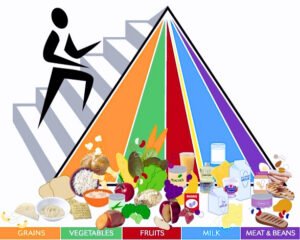
9. Building Your Personalized Balanced Diet Chart
Creating a balanced diet chart involves thoughtful planning and consideration of your specific needs. Here’s a step-by-step guide to help you get started:
1. Measure Your Goals
Determine whether your goal is to lose weight, maintain your current weight, or gain weight. Your goals will affect your calorie intake.
2. Calculate Your Daily Calorie Requirements
Use an online calculator or consult with a healthcare professional to determine your daily calorie needs based on factors such as age, gender, activity level, and goals.
3. Plan Your Meals
Divide your daily calorie intake into three main meals and two to three snacks. Make sure each meal has a balance of carbohydrates, proteins, and healthy fats.
4. Choose Nutrient-Rich Foods
Choose foods that provide a wide range of essential nutrients, such as whole grains, lean protein, and colorful fruits and vegetables.
5. Mindful Eating
Practice mindful eating by paying attention to hunger cues and eating slowly. This can help prevent overeating and promote digestion.
6. Stay Hydrated
Aim to drink at least eight glasses of water per day to stay properly hydrated.
7. Monitor your progress
Keep a food diary to track your daily intake and make adjustments as needed to meet your goals.
Conclusion
In conclusion, a balanced diet is not a one-size-fits-all solution, but rather an individualized approach to nutrition. By understanding your own dietary needs and making informed choices, you can begin the journey toward a healthier and happier life.
FAQs
Q1. What is the ideal proportion of carbohydrates, proteins, and fats in a balanced diet?
A1. The ideal proportion varies from person to person but generally includes 45-65% carbohydrates, 10-35% protein, and 20-35% fat.
Q2. Can a balanced diet help with weight loss?
A2. Yes, a balanced diet can support healthy weight loss when combined with regular exercise.
Q3. How often should I reassess my diet chart?
A3. It’s a good practice to reassess your diet chart every few months or when your lifestyle changes significantly.
Q4. Are supplements necessary for a balanced diet?
A4. In most cases, you can obtain all the necessary nutrients from a balanced diet. Consult a healthcare professional before taking supplements.
Q5. Can I indulge in occasional treats and still maintain a balanced diet?
A5. Yes, occasional treats are acceptable in moderation. The key is balance and portion control.
You might be like this also :
1. Lose Weight by Running: Transform Your Life by Losing Weight Through Running
2. Fitness Target in short-period: The Great Module to Achieving Your Goals

